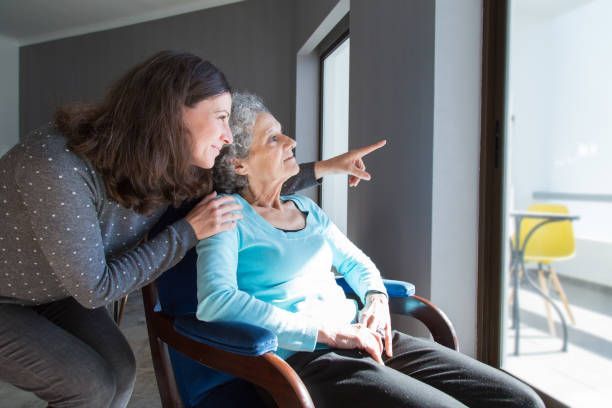How to Confront a Parent’s Dementia: A Guide for Families
How to Confront a Parent's Dementia: A Guide for Families
At 7 Day Home Care, we understand the immense value and necessity of highly trained and experienced home health aides in dementia care. Families confronting dementia face numerous challenges, from managing unpredictable behaviors to ensuring the safety and well-being of their loved ones. Our skilled caregivers bring not only expertise in dementia-specific care techniques, but also compassion and patience, helping to maintain a calm and supportive environment. By providing assistance with daily tasks, cognitive stimulation, and emotional support, our home health aides enhance the quality of life for those with dementia, while offering peace of mind to families navigating this difficult journey.

Dementia Affects Not Only the Individual Diagnosed but Also the Entire Family
Watching a parent or loved one struggle with dementia can be one of the most challenging experiences of your life. Dementia affects not only the individual diagnosed but also the entire family. As the disease progresses, it brings with it emotional, mental, and practical hurdles that families must navigate. Learning how to confront a parent’s dementia head-on can help you provide the best support possible and prepare you for the stages to come.
This article will explore essential strategies to confront a parent’s dementia, focusing on how to communicate, plan for the future, and care for both your parent and yourself during this time. Let’s walk through the steps to understanding and dealing with this life-changing diagnosis.
1. Understanding Dementia: What You Need to Know
Dementia is a broad term used to describe symptoms that affect memory, thinking, and social abilities. It’s not a specific disease, but rather a group of conditions that impact the brain, the most common being Alzheimer’s disease. Understanding what dementia is, its stages, and how it progresses is the first step in confronting it.
Early Signs of Dementia
Your parent may show early signs of dementia that are easy to dismiss as normal aging. These include:
• Difficulty remembering recent events or conversations
• Repeatedly asking the same questions
• Misplacing items and forgetting where they left them
• Difficulty concentrating or completing tasks
• Struggling with decision-making or problem-solving
It’s important to note that early diagnosis can make a significant difference in the quality of life for both your parent and your family. As soon as you notice consistent signs of cognitive decline, seeking a medical evaluation can help determine if it’s dementia and what type.
2. Communicating with a Parent Who Has Dementia
One of the most difficult aspects of dementia is watching your parent’s communication skills decline. You may find it increasingly hard to have meaningful conversations as they struggle to find words or forget the topic. Here are some strategies for communicating effectively with a parent with dementia:
Use Simple Language
When speaking with your parent, use clear and straightforward sentences. Avoid complicated words or phrases, and give them time to process what you’ve said. If they seem confused, rephrase your statement instead of repeating it.
Practice Active Listening
Even if your parent’s words seem incoherent or don’t make sense, listen patiently. Give them time to express themselves without interruption, and acknowledge their feelings, even if the content of the conversation is disjointed. This helps them feel valued and understood.
Avoid Arguing or Correcting
It can be tempting to correct your parent when they say something factually wrong or confuse past events, but it’s often more beneficial to go along with their version of reality. Arguing or correcting may increase their frustration or anxiety.
Use Non-Verbal Communication
As dementia progresses, non-verbal communication such as touch, facial expressions, and body language can become just as important as words. A gentle touch on the arm or a warm smile can convey comfort and reassurance when words fail.
3. Planning for the Future
Confronting your parent’s dementia also means planning for their future care. While early stages of dementia may allow for independence, advanced stages typically require full-time support. Begin the planning process early to avoid making rushed decisions during a crisis.
Legal and Financial Planning
It’s crucial to handle legal and financial matters as soon as possible after a dementia diagnosis. Having the following documents in place will help you manage your parent’s affairs when they are no longer able to:
•Power of Attorney: This document allows you or a designated family member to make financial and legal decisions on your parent’s behalf.
•Living Will: A living will outlines your parent’s preferences for medical care and end-of-life decisions.
•Health-Care Proxy: A healthcare proxy allows you to make medical decisions for your parent if they become unable to communicate their wishes.
Choosing the Right Care Options
As your parent’s dementia progresses, you’ll need to consider care options such as home care services, assisted living, or a memory care facility. In-home care, such as services provided by 7 Day Home Care, can help your parent remain in familiar surroundings while receiving the necessary support from certified home health aides. This can be an ideal option for maintaining quality of life without the upheaval of moving to a facility.
4. Caring for Yourself While Caring for Your Parent
Caring for a parent with dementia is emotionally taxing. Family caregivers often experience burnout, stress, and anxiety while trying to balance their parent’s needs with their own lives. It’s essential to recognize that you cannot care for someone else if you are not also caring for yourself.
Seek Emotional Support
Whether it’s joining a caregiver support group, seeking therapy, or talking with friends and family, don’t hesitate to reach out for emotional support. You’re not alone in this journey, and sharing your experiences with others who understand can be incredibly helpful.
Take Breaks
Guilt often accompanies the desire to take a break from caregiving, but rest is necessary. Whether it’s taking a short walk, enjoying a hobby, or scheduling respite care, taking time for yourself is crucial for avoiding burnout.
Know Your Limits
It’s important to recognize when the demands of caregiving are exceeding your capacity. Full-time caregiving can lead to physical and emotional exhaustion. Hiring professional home care services can provide the support you need while ensuring your parent receives consistent care.
5. Navigating the Emotional Journey
Dementia doesn’t just affect memory and cognitive ability; it impacts emotions and relationships. It can be difficult to accept that the person you once knew is changing. Feelings of grief, anger, frustration, and sadness are common among family members. Here’s how you can manage your emotional journey:
Accept the Diagnosis
Coming to terms with your parent’s dementia diagnosis is one of the hardest steps. While it’s natural to feel sad or even in denial, acceptance allows you to plan for the future and provide the best care possible. Educating yourself about the disease and understanding its progression can help make this transition easier.
Cherish the Good Days
Dementia is a progressive condition, but there will still be good days. Cherish the moments when your parent seems like their old self. These good days can be a source of strength and comfort as the disease progresses.
Prepare for Difficult Behavior
As dementia advances, your parent may display challenging behaviors such as aggression, wandering, or paranoia. Understand that these behaviors are a result of the disease and not a reflection of your parent’s personality. Stay calm, avoid confrontation, and consult healthcare professionals for advice on how to handle these situations.
6. Involving the Whole Family
Caring for a parent with dementia often involves the entire family. It’s important to communicate openly with siblings and other relatives to ensure everyone is on the same page regarding your parent’s care. Here are some ways to involve your family:
Delegate Responsibilities
If you’re the primary caregiver, don’t be afraid to delegate tasks to siblings or other relatives. This could include taking your parent to medical appointments, handling finances, or spending time with them so you can have a break.
Hold Family Meetings
Regular family meetings can be helpful for discussing your parent’s care, sharing updates, and addressing any concerns. This also provides an opportunity to make decisions collectively and ensure that everyone feels involved.
Be Open About the Challenges
Caregiving can be overwhelming, and it’s important to be open with your family about the emotional and physical challenges you’re facing. This can help create a supportive environment and prevent resentment from building up.
7. Professional Support for Dementia Care
As the demands of caregiving increase, professional support can be a lifeline for both you and your parent. 7 Day Home Care provides specialized dementia care services tailored to meet the unique needs of individuals with cognitive decline. Our certified home health aides offer compassionate care, helping your parent maintain dignity and quality of life while providing respite for family caregivers.
Benefits of Home Care Services
•Familiar Environment: Staying in their own home can provide a sense of comfort and familiarity for individuals with dementia, reducing anxiety and confusion.
•Personalized Care: 7 Day Home Care offers personalized care plans that address your parent’s specific needs, from medication management to personal hygiene and companionship.
•Flexibility: Home care services can be tailored to fit your schedule, whether you need part-time support or around-the-clock care.
Confronting a parent’s dementia is an emotional and practical journey that requires patience, preparation, and support. By understanding the disease, communicating effectively, planning for future care, and seeking help when needed, you can provide the best possible care for your parent while also taking care of yourself. Remember, you don’t have to do it alone. Professional home care services like those offered by 7 Day Home Care can provide the support and expertise you need to navigate this challenging time.
If you or your family is in need of compassionate dementia care, contact 7 Day Home Care today to discuss how we can assist you in creating a care plan that suits your parent’s needs. 7 Day Home Care is licensed by the New York State Department of Health to provide home care services in Manhattan, Queens, Brooklyn, Nassau County, and Suffolk County, New York. To learn more about our home care services, please call 516-408-0034.
Brian Callahan
7 Day Home Care










